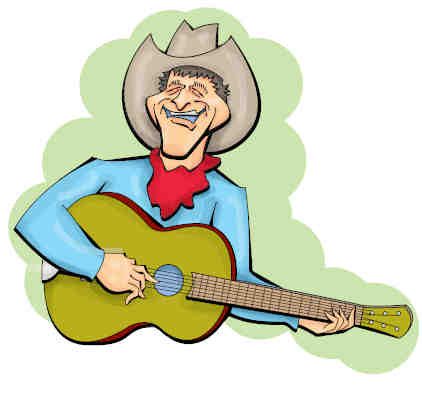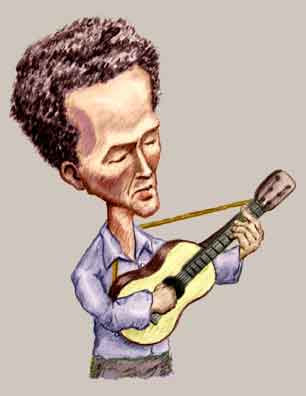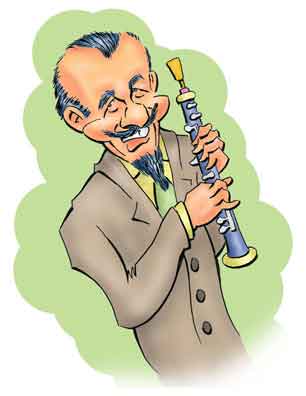Ramblin' Jack Elliott

(Click to Zoom In and Out)
In 1954 and during one of his many ramblings, Woody Guthrie stopped by the home of Butch and Bess Hawes who lived on the west edge of Los Angeles. Bess was the sister of Alan Lomax, who had been the archivist of the Library of Folk Songs at the Library of Congress. At one point she heard Woody talking in the next room.
When she walked in, she found it wasn't Woody. It was his young friend and traveling companion from New York, Eliot Adnopoz.
Of course, in later years, Eliot - under the name of Ramblin' Jack Elliott - became the best singer of Woody's songs. His skill at singing Woody's compositions once prompted Woody to say, "Jack sounds more like me than I do."

Woody Guthrie
He sounded less like Woody than Jack did.
But what is not known is that Jack's singing of Woody's songs was to have a surprising effect on the world's greatest literature. Not just back then but now!
This statement requires some explanation, obviously.
In February 1951 Woody had a misdiagnosed attack of appendicitis and nearly died. While he was recovering at the Coney Island Hospital, Jack - then only 19 and a big fan of Woody's music - showed up during visitor's hours. Woody, not feeling in top form, suggested Jack go outside and visit with his kids.
Eventually, though, Jack and Woody became good friends and Jack learned first hand how to sing and play Woody's songs. But the truth is - and this may seem heresy - Jack was a much better singer and guitar player than Woody1. This was fortunate for Jack since the 1950's was also the beginning of what became the Folk Song Revival which ended up with folk music programs being broadcast on network television - something that's unthinkable today. By the end of 1961, Jack himself had eight albums to his credit. One was even produced by Columbia which was one of the biggest mainstream record companies and boasted top-notch hautboist and sing-along-meister Mitch Miller as one of its executives.
Footnote
Even Woody's friends acknowledged his forte was songwriting rather than performing. "Oh, he wasn't the greatest guitar player," Pete Seeger commented. "He could do a perfectly acceptable accompaniment; play a few fancy licks." Woody's cousin, Jack Guthrie also sounded a lot like Woody and could play and sing much better. Jack had become a fairly big Country and Western star by the time of his death in 1948 age 32.

Mitch Miller
Top Notch Hautboist.
The beginning of the commercial folk craze came in 1958 with the hit song "Tom Dooley". Sung by the completely non-political and incredibly clean cut Dave Guard, Bob Shane and Nick Reynolds as the Kingston Trio, the song rose to #1 on Billboard's Pop Chart by November. It's success was unprecedented to the extent that it immediately inspired a movie which appeared the following year. The Legend of Tom Dooley starring Michael Landon (Little Joe on Bonanza and Charles Ingalls - the father - on Little House on the Prairie) the movie fiddles with the facts quite a bit and is now virtually forgotten2.
Footnote
Thomas Dula was indeed a real person who was convicted for the murder of Laura Foster in Wilkes County, North Carolina. Laura was last seen on May 25, 1866, and her body was found in a shallow grave on June 18. Most suspiciously Tom had absconded from the area but was later arrested and tried for the murder. He was executed on May 1, 1868. The story attracted widespread national interest and accounts appeared in New York newspapers.
A number of songs about the murder were written over the years. The Kingston Trio's version was essentially that of folklorists Frank and Anne Warner. They in turn had learned the song from a North Carolina farmer, carpenter, and banjo maker, Frank Proffitt. Frank, by the way, made virtually no money from the recording.
But 1958 was also the year that the young Robert Allen Zimmerman moved from Minneapolis to New York. As an off-again-on-again student at the University of Minnesota, Bob had been part of the folk song scene around Dinkytown - the campus corner of Minnesota. He heard some of Woody's recordings which at the time weren't very numerous3 and he became a true fanatic. Bob managed to borrow a copy of Bound for Glory which was Woody's account of his growing up in Oklahoma and Texas. When he finished the book he was determined to meet Woody who he learned was living in New York.
Footnote
Not counting reissues and later compilations, Woody only had one really mainstream album, Dust Bowl Ballads, produced by Victor Records in 1940. The original Victor album was just that, a set of 78 rpm recordings packaged in individual sleeves and only sold about 500 copies. The sales were so poor that Victor was no longer interested in the songs when record technology advanced to producing 33 ⅓ rpm long playing albums.
Most of Woody's recordings were issued by Moses Asch who owned Asch Records which later became the Folkways label. Moe was able to get the rights to Dust Bowl Ballads and in 1964 issued a modern LP. It's still available on the Smithsonian/Folkways label.
Woody, though, was no longer living on Coney Island. Instead he was confined to the Greystone State Hospital in New Jersey with Huntington's disease which he had inherited from his mother, Nora. Huntington's disease (earlier called Huntington's chorea) is a condition where the brain cells deteriorate and the victim eventually looses all muscle control. The symptoms usually appear between ages of 30 to 50 although many victims live into their early 60's. There is no cure and death is due to complications from the loss of muscle control or infection4.
Footnote
Woody symptoms - although they weren't recognized as such - appeared in the late 1940's when he was in his early thirties. He was finally diagnosed as having the disease in 1952, and by the mid-1950's he required constant care and died October 3, 1967 at age 55.
Bob hitchhiked east and with the surname Dylan began singing in the Greenwich village folk clubs. Finally he was able to visit Woody in the hospital. It was there in 1961 that he met Jack after Jack had returned from performing in England. Bob introduced himself and said he had some of Jack's albums. Soon they were sitting down and singing together.
When Bob met Woody, Woody was no longer able to sing or play the guitar. So he learned to sing like Woody by singing like Jack singing like Woody. If you compare Jack and Bob's vocals, you actually hear greater similarities between them than with Woody5. Bob also liked Jack's guitar playing and nowadays they both play in a similar style and with considerable skill.
Footnote
Woody's voice - it's timbre - was deeper and huskier than either Jack or Bob. This is particularly noticeable on later recordings.
We have to wonder, then. Did Bob's distinctive singing style - once heard never forgotten - influence his songwriting that garnered the fame and popularity that it did6. Well, whether it did or didn't, we still must tip the hats to Jack's influence on Bob's long career, a career that in 2016 landed him the Nobel Prize in Literature.
Footnote
One factor for the widespread popularity of Bob's songs is that they don't make in-your-face political statements. Instead the messages can be interpreted to suit almost anyone regarding of their party affiliation. One exception is "Talking John Birch Blues" which not coincidentally is one of Bob's least known compositions.
That Jack's fame isn't as wide as Bob's doesn't seem to bother him. After all, Jack has his fans and he's picked up two Grammy Awards (1996 and 2010). As far as Bob's songs, Jack said "I've always thought his songs were beautifully put together though I don't try to understand what the words mean." As far as Bob's rise to fame, distinction, and incredible wealth all Jack said was "He owes me $12. But that's OK."
Jack has also written a number of songs. His masterpiece is "912 Greens" which is a long talking song about traveling around with Guy Carawan and meeting banjo player Billy Faier in New Orleans. As common in such musical narratives the song varies somewhat with each performance.
In closing we have to mention one album that has one of Jack's best performances and that even Jack's most rabid fans may not be aware of. Back in the days when there were record stores, you could sometimes find it in the discount bins.
The credits were
John Raitt
(Operatic and Broadway baritone and Father of Bonnie Raitt)
Florence Henderson (!)
(Yes, the "mom" on the Brady Bunch)
Phyllis Newman (!!)
(Phyllis Newman?)
and ..... (of course)...
Jack Elliott
!!!!!!!!!!!!!!!!!!!
Once you saw the title of the album, you knew what Jack would sing. Sure enough, his first song started off:
I got to Kansas City on a Friday
By Saturday I'd learned a thing or two.
But up 'till then I didn't have an idee
Of what the modern world was comin' to.
Yep. Jack sang the part of Will Parker - and it was Phyllis who played Annie Ado, for crying out loud!
And we all know the title, of course.
References
Ramblin' Jack Elliott Discography, Discogs.
Woody Guthrie: A Life, Joe Klein, Knopf, 1980.
"Ramblin' Jack Elliott Knows All of the Folk-Music Greats - and Some of Them Owe Him Money", Brad Wheeler, The Globe and Mail October 25, 2016.
"Woody Guthrie", Pete Seeger (Host), Sholom Rubinstein (Producer), Toshi Seeger (Director/Chief Cook and Bottle Washer), Rainbow Quest, 1965.
"The Death Penalty: Shocking Revelations of Crime and Depravity in North Carolina - Thomas Dula Hanged for the Murder of Laura Foster", The New York Herald, May 2, 1868, Page 7, Chronicling America, Library of Congress.
The Legend of Tom Dula, Michael Landon, (Actor), Jo Morrow (Actor), Jack Hogan (Actor), Stanley Shpetner (Writer and Producer), Ted Post (Director), Columbia Pictures, 1959, Internet Movie Data Base.
Woody Guthrie Discography, Discogs
Ramblin' Jack Elliott Discography, Discogs
"Huntington's Disease", Mayo Clinic.
"Age at Death and Causes of Death in Patients with Huntington Disease in Norway in 1986-2015", Olga Solberg, Petra Filkuková, Jan Frich, and Kristin Billaud Feragena, Journal of Huntington's Disease, . 7(1): pp. 77-86. 2018.